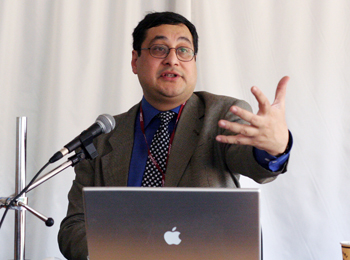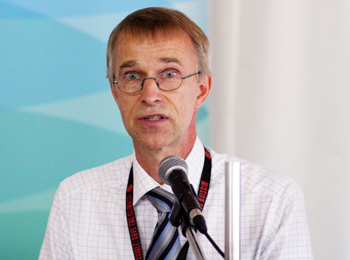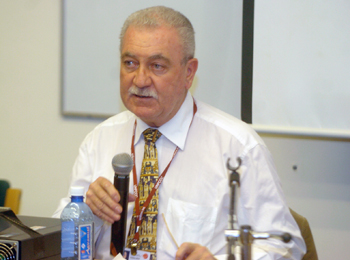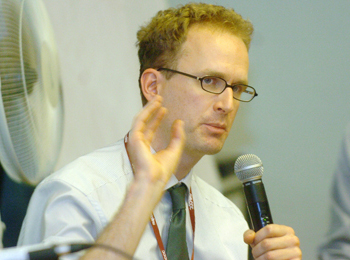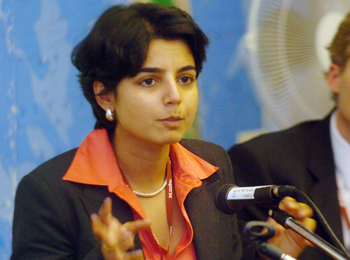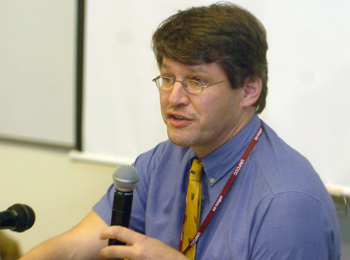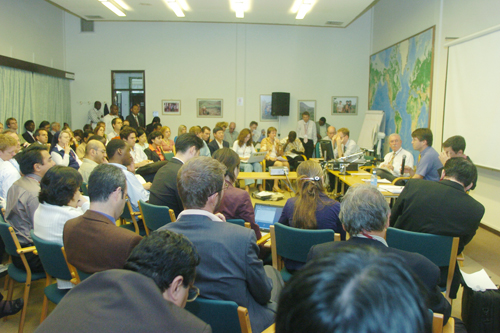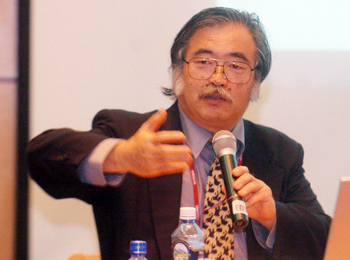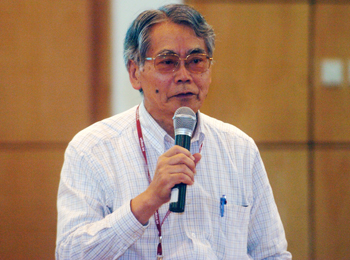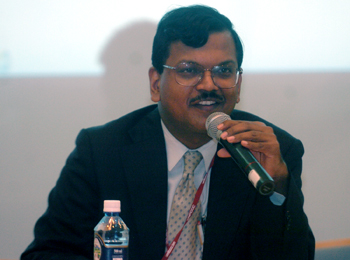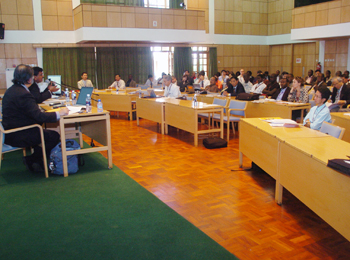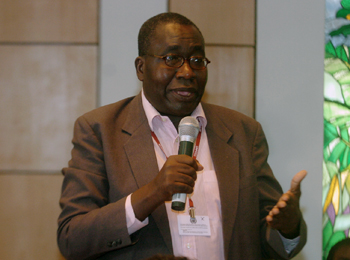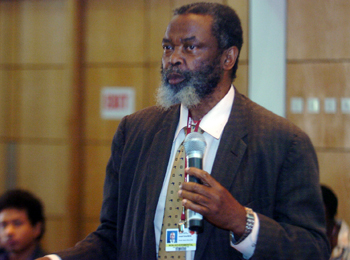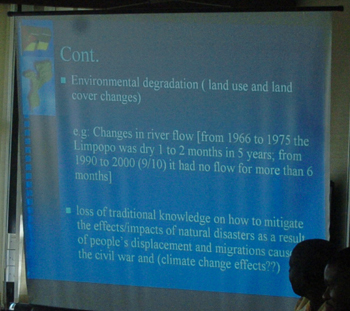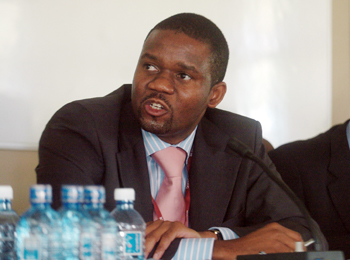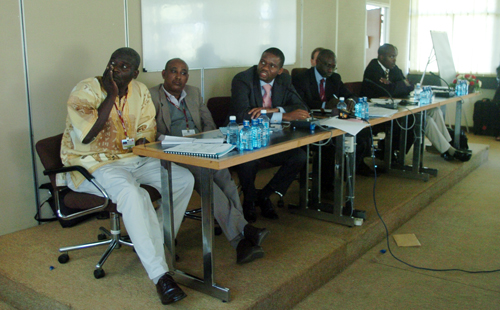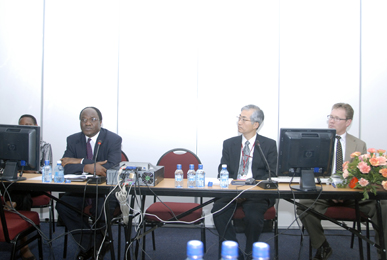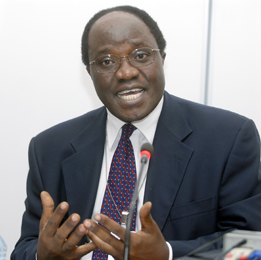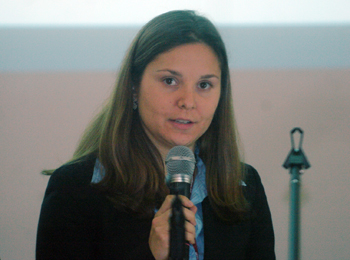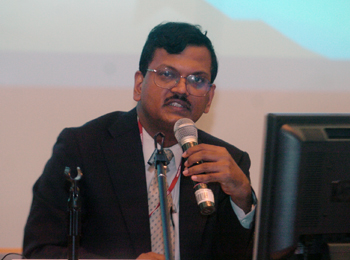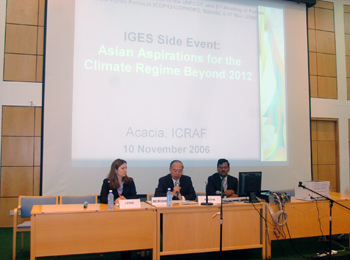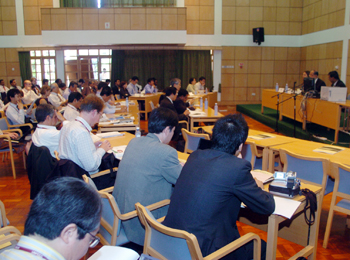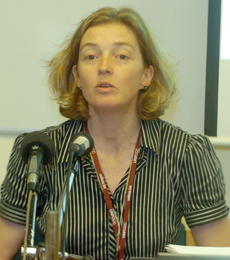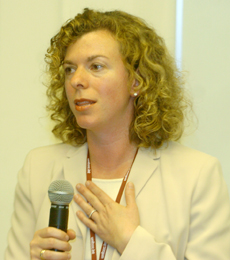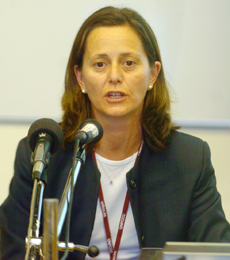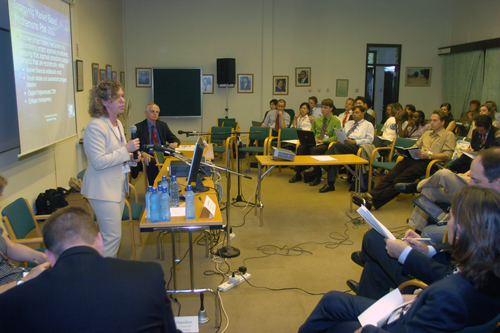 |
||
|
Published by the International Institute for Sustainable Development (IISD)
|
|||
|
A Special Report on Selected Side Events at the Second Conference of the Parties serving as the Meeting of Parties to the Kyoto Protocol (COP/MOP 2) and Twelfth Conference of the Parties (COP 12) to the UN Framework Convention on Climate Change (UNFCCC)
|
|||||
| 6-17 November 2006 | Nairobi, Kenya | |||||
 |
|||
 |
|||
Events convened on Friday, 10 November 2006
|
Reforming global environmental governance: climate change and beyond Presented by Denmark/Tufts-Fletcher School of Law and Diplomacy |
|||
|
Frode Neergaard, Danish Ministry of Foreign Affairs, highlighted that the 2002 intergovernmental discussion on international environmental governance and the French efforts for UNEP reform for better environmental governance provided impetus for the current study on global environmental governance (GEG), titled “Global Environmental Governance: a reform agenda.”
Adil Najam, Tufts-Fletcher School of Law and Diplomacy, presented the main findings of the study, noting that the problem with the current discussion on GEG is the presence of “too many people looking at too few pieces.” Explaining that the study celebrates the successes of the existing environmental governance process, he highlighted the key question it poses: “What is worth doing and what is doable?” Najam emphasized that the study has three important dimensions, namely, the problem and its key features (symptoms), the reasons behind them (diagnosis) and the proposals for reform (prescriptions). He described a number of reasons for failure of previous reforms, including an adversarial approach by reformers, system inertia and lack of good leadership. He underscored that reform is not easy but is inevitable. He elaborated that important goals in designing reform include creating system coherence, enrolling good leadership, inclusion of various knowledge types and building a performance-driven system. He then recommended that better cooperation could be achieved if one person heads more than one secretariat and if there could be an independent body of high level scientists in UNEP to produce authoritative knowledge. He also suggested that coherence could be ensured over three institutional levels where the highest degree of communication occurs at the innermost core that contains key environmental organizations such as UNEP. Participants discussed, inter alia: the challenges of leadership for creating good GEG and making connections between environment and trade; the low profile of environment in certain countries; the resistance by actors towards coordination; and the need for using existing channels of coordination within organizations over building new organizations. |
|||
|
|
|||
|
Bioenergy and the CDM Presented by FAO |
|||
|
Gustavo Best, Food and Agriculture Organization (FAO), presented the draft of the forthcoming paper titled “Analyzing the contribution of bioenergy to sustainable development under CDM,” which examines bioenergy CDM projects in the light of sustainable development criteria and indicators, including poverty alleviation and human development. He highlighted the lack of pilot projects for new methodologies relating to measuring GHG emission reductions and inadequate representation of bioenergy on CDM, especially non-sustainable biomass as critical concerns.
Glenn Hodes, UNEP Centre Risoe, presented a draft version of the forthcoming FAO/UNCTAD/UNEP paper on bioenergy and CDM, which attempts to bridge the existing gaps on methodologies and inequitable distribution. He pointed out some barriers to biofuel projects, including high initial capital costs, volatile oil crop prices, and weak regulatory frameworks. Mahua Acharya, World Bank, focused on projects that reduce or replace non-renewable biomass (NRB). She explained that the proposed methodologies on NRB are yet to be agreed by the CDM EB (Executive Board), which currently requires that the project baseline use fossil fuel as a parameter rather than the actual fuel that is being substituted. On methodologies, Lambert Schneider, Öko-Institut, discussed liquid biofuel cases, while Jonathan Avis, EcoSecurities, noted that accuracy on methodology increases the number of CERs to be obtained in a project. Bernhard Schlamadinger, Joanneum Research, stressed that NRB brings benefits to sustainable development and climate change and that leakage issues are soluble. In ensuing discussions, some participants expressed concerns about the sustainability of biofuel projects, their negative impacts on indigenous communities and further degradation of land. |
|||
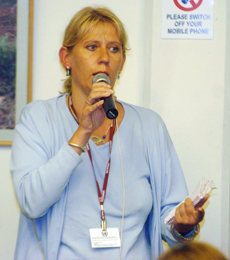 |
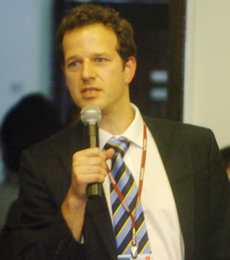 |
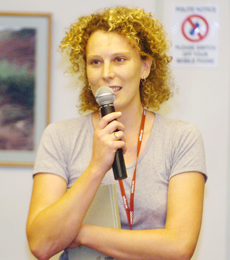 |
|||||
|
Simone Lovera, Global Forest Coalition
|
Jan Fehse, EcoSecurities
|
Claudia Doets, Netherlands Development Organisation (SNV)
|
|||||
|
|||
|
Bridging climate change and development experiences in the Asia-Pacific region Presented by OECC |
|||||
|
Makoto Kato, Overseas Environmental Cooperation Center (OECC), Japan, highlighted the findings of the 16th Asia-Pacific Seminar on Climate change (APS 16) and acknowledged the growing interest in mainstreaming climate change into development planning and governance processes in the region. Dadang Hilman, Ministry of Environment, Indonesia, outlined the objectives of Indonesia’s climate change strategy, which includes building awareness on climate change, networking with stakeholders, enhancing technical knowledge and ensuring coordinated development planning amongst relevant ministries. S. Muthusamy, Economic Planning Unit, Malaysia, described the Unit’s role in defining the macroeconomic outlook and development budget allocation, adding that challenges include attaining a balance between development needs and environmental protection objectives. Ryokichi Hirono, Seikei University, Japan, named the benefits of mainstreaming climate change in development plans and policies, including: reduced vulnerability of development to climate change; more sustainable and equitable development between generations and sub-national regions; and attainment of sustainable human development. Hirono listed barriers to mainstreaming climate change in developing countries, including relegation of climate change mitigation and adaptation to ministries of environment with a resultant lack of prioritization of climate change in national development planning. Ancha Srinivasan, IGES, proposed that knowledge of local impacts of climate change by concerned stakeholders should leverage engagement with policy makers. During discussions, a participant lamented “environmental illiteracy” and proposed integration of environmental education in education curricula. |
|||||
|
|||
|
Climate risk management in practice in Africa – the inaugural climate and society publication Presented by Columbia University |
|||
|
Stephen Zebiak, The International Research Institute for Climate and Society (IRI), introduced the “Climate and Society Report” series, which responds to the need to raise awareness regarding climate risk management. He explained that the series compiles knowledge and best practices from case studies such as those showcased by the panelists.
Samson Katikiti, World Health Organization, emphasized the importance of adequate preparation and timely responses to reduce mortality rates resulting from malaria epidemics. He noted the impact of rainfall variability and the role of rainfall forecasting in ensuring adequate preparation. Teshome Erkineh, Disaster Prevention and Preparedness Agency, highlighted factors that facilitated the successful aversion of the 2002-2003 famine in Ethiopia, including a shift in approach from emergency food aid to disaster risk management. Filipe Domingos Freires Lúcio, National Meteorological Institute, Mozambique, underscored the importance of political commitment, involving communities in risk assessments and integrating all warning systems in mitigating the impacts of floods. Duncan Warren, National Smallholder Farmers’ Association of Malawi, described a weather risk insurance pilot project to alleviate the burden that smallholder farmers face in paying back loans following drought-related crop failures. Patrick Luganda, Network of Climate Journalists in The Greater Horn of Africa, highlighted the role that the media can play in influencing decision makers to incorporate climate information into their daily planning. He suggested that strong science reporting can help the media shift from addressing climate reactively to addressing it pre-emptively. |
|||
|
|||
|
Compliance – the Kyoto Protocol and the broader MEA context Presented by UNFCCC |
|||
|
Hamanaka Hironori, Co-Chairperson, Compliance Committee of the Kyoto Protocol, presented an overview of the Committee’s activities. He emphasized the importance of a strong compliance regime to enable environmental integrity and transparency of GHG accounting and to ensure the credibility of the carbon market. Hironori described the functioning of the facilitative and enforcement branches of the Committee and the process by which submissions are made and processed.
Gilbert Bankobeza, UNEP, explained that compliance mechanisms under multilateral environmental agreements (MEAs) are transitioning from traditional dispute-settlement mechanisms towards more incentive-based approaches. He underscored that incentive-based compliance regimes are intended to facilitate, promote and enforce compliance to commitments under MEAs through cooperative, non-judicial, non-confrontational and transparent processes. Bankobeza stressed that, when addressing issues of compliance, it is important to ensure that every Party stays “in the fold.” He described the success of the non-compliance procedure under the Montreal Protocol. Elizabeth Mrema, UNEP, provided a comparative analysis of four key approaches taken by most environmental treaties to ensure effective implementation: performance review information, multilateral non-compliance procedures, non-compliance response measures and dispute resolutions procedures. She compared the use of these four approaches by fifteen MEAs. Mrema introduced the new UNEP publication “Manual on Compliance With and Enforcement of Multilateral Environmental Agreements.” Participants discussed the complexity of achieving compliance under the Kyoto Protocol relative to other MEAs and the tendency for Parties to choose compliance mechanisms based not on their effectiveness but on the “lowest common denominator” achievable by consensus. |
|||
|
|||
|
Asian aspirations for climate regime beyond 2012 Presented by IGES |
|||
|
Ancha Srinivasan, Institute for Global Environmental Strategies (IGES), overviewed the report “Asian Aspirations for Climate Regime Beyond 2012” and outlined key issues of the regional and national consultations. Srinivasan proposed that future climate regime discussions must consider complementarities between climate change, energy security and development more proactively and provide clarity on adaptation financing.
Joanna Lewis, Pew Center on Global Climate Change, summarized the “International Climate Efforts Beyond 2012 Report of the Climate Dialogue at Pocantico.” She noted the clear scientific justification for stronger action on climate change and proposed elements to strengthen multilateral action. PR Shukla, Indian Institute of Management, emphasized that developing economies should have access to technologies that do not lock them in to conventional energy intensive development paths. Jin-Gyu Oh, Korea Energy Economic Institute, stated that the Asian aspiration for the post-2012 regime would be to develop sustainable energy systems such as renewable energy. Gerarda Asuncion D. Merilo, Department of Environment and Natural Resources, the Philippines stressed that adaptation and mitigation should be placed on an equal footing. Dadang Hilman, Ministry of Environment, Indonesia, named taxation of private companies using fossil fuels as a possible adaptation funding source. Amjad Abdulla, Ministry of Environment, Energy and Water, Maldives, indicated that mainstreaming of adaptation in national planning is taking place in most countries of the region. |
|||
|
|||
|
Business views on market-based approaches post-2012 Presented by BSCE |
|||
|
James Wolf, Business Council for Sustainable Energy (BCSE), US, highlighted the importance of putting forth business views on the long-term dialogues of cooperative action on climate change issues.
Lisa Jacobsen, BCSE, US, emphasized that market-based approaches offer a way forward for sustainable development. She suggested that there is a need for stronger price signals, a clear long-term regulatory environment and streamlining the CDM process. Kirsty Hamilton, BCSE, UK, presented a paper on business views on international climate and energy policy. She highlighted that carbon market continuity is an issue of concern, small businesses are still unable to understand the climate discourse and the links between EU-ETS and CDM, differing views exist on whether EU-ETS would survive if Kyoto collapses. Francesca Cerschia, Econergy International, noted a number of important issues that need to be tackled for post-2012, including: the inability of EB’s learning-by-doing approach build market confidence; and the presence of considerable regulatory risks relating to additionalities, validation, verification, and trading of CERs. Jeff Moe,Trane, highlighted that policy can establish incentives for carbon savings and that CDM could play a role in creating more environmentally-responsive buildings. William Greene, Point Carbon, stressed that there are very strong signals for the continuation of flexibility mechanisms post-Kyoto and that some possible changes in the post-Kyoto scenario might include more relaxed rules for small-scale CDM projects and streamlining of CDM EB procedures. Participants discussed the meaning of regulatory “global” certainty, use of simple fiscal measures for technology transfer, and possibilities for BCSE’s outreach program to link with African business organizations. |
|||
|
|||
|
||
|
Click the above button to go back to our ENB main coverage
|
||
|
|
|
|
|
||
|
